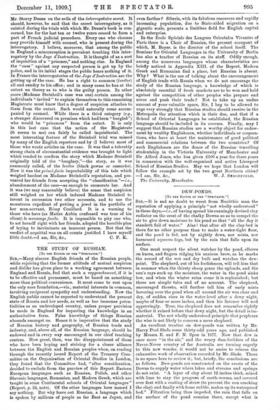THE STUDY OF RUSSIAN.
[To THE EDITOR OF THE "SPECTATOR:1 SIR,—Many sincere English friends of the Russian people, while rejoicing that the former attitude of mutual suspicion and dislike has given place to a working agreement between England and Russia, feel that such a rapprochement, if it is to be effective and permanent, must be based on something more than political convenience. It must come to rest upon the only sure foundation,—viz., material interests in common, involving reciprocal sympathy and understanding. Now the English public cannot be expected to understand the present state of Russia and her needs, as well as her immense poten- tialities as an undeveloped country, unless proper provision be made in England for imparting the knowledge in an authoritative form. False knowledge of things Russian abounds amongst us. Hence it is imperative that the study of Russian history and geography, of Russian trade and industry, and, above all, of the Russian language, should be endowed and in every way encouraged in our chief teaching centres. How great, then, was the disappointment of those who have been hoping and striving for a closer alliance between the English and Russian peoples when, on reading through the recently issued Report of the Treasury Corn- - mittee on the Organisation of Oriental Studies in London, they found that the Committee bad, "after consideration, decided to exclude from the purview of this• Report Eastern European languages such as Russian, Polish, and othsr Slavonic languages, Rumanian, and Modern Greek, which are taught in some Continental schools of Oriental languages" (Report, p. 24, note). Of the other languages here named I say nothing. But why leave out Russian, a language which is spoken by millions of people as far East as Japan, and
even farther P Siberia, with its fabulous resources and rapidly increasing population, due to State-aided migration on a gigantic scale, presents a limitless field for English capital and enterprise.
In the ].cole Speeiale des Langues Orientales Vivantes of Paris there is a Chair of Russian, the present occupant of which, M. Boyer, is the director of the school itself. The Seminar for Oriental Languages in the University of Berlin has also a teacher of Russian on its staff. Oddly enough, among the numerous languages whose characteristics are briefly noticed in Appendix XIII of the Report, Modern Greek and Rumanian find a place, but Russian is absent. Why ? What is the use of talking about the encouragement of English trade with Russia when we do not encourage the study of the Russian language, a knowledge of which is absolutely essential if fresh markets are to be won and held against the competition of other peoples who prepare and nurse and push their trade ? Not to take up an undue amount of your valuable space, Sir, I beg to be allowed to urge very strongly that Russian studies should receive in the Metropolis the attention which is their due, and that if a School of Oriental Languages be established, the Russian language should be included in its courses. Finally, may I suggest that Russian studies are a worthy object for endow- ment by wealthy Englishmen, whether individuals or corpora- tions, who have at heart the maintenance of good political and commercial relations between the two countries P Of such Englishmen are the donor of the Russian • travelling studentship in the Victoria University of Manchester and Sir Alfred Jones, who has given £100 a year for three years in connexion with the well-organised and active Liverpool School of Russian Studies. May we hope that London will follow the example set by the two great Northern cities?
























































 Previous page
Previous page